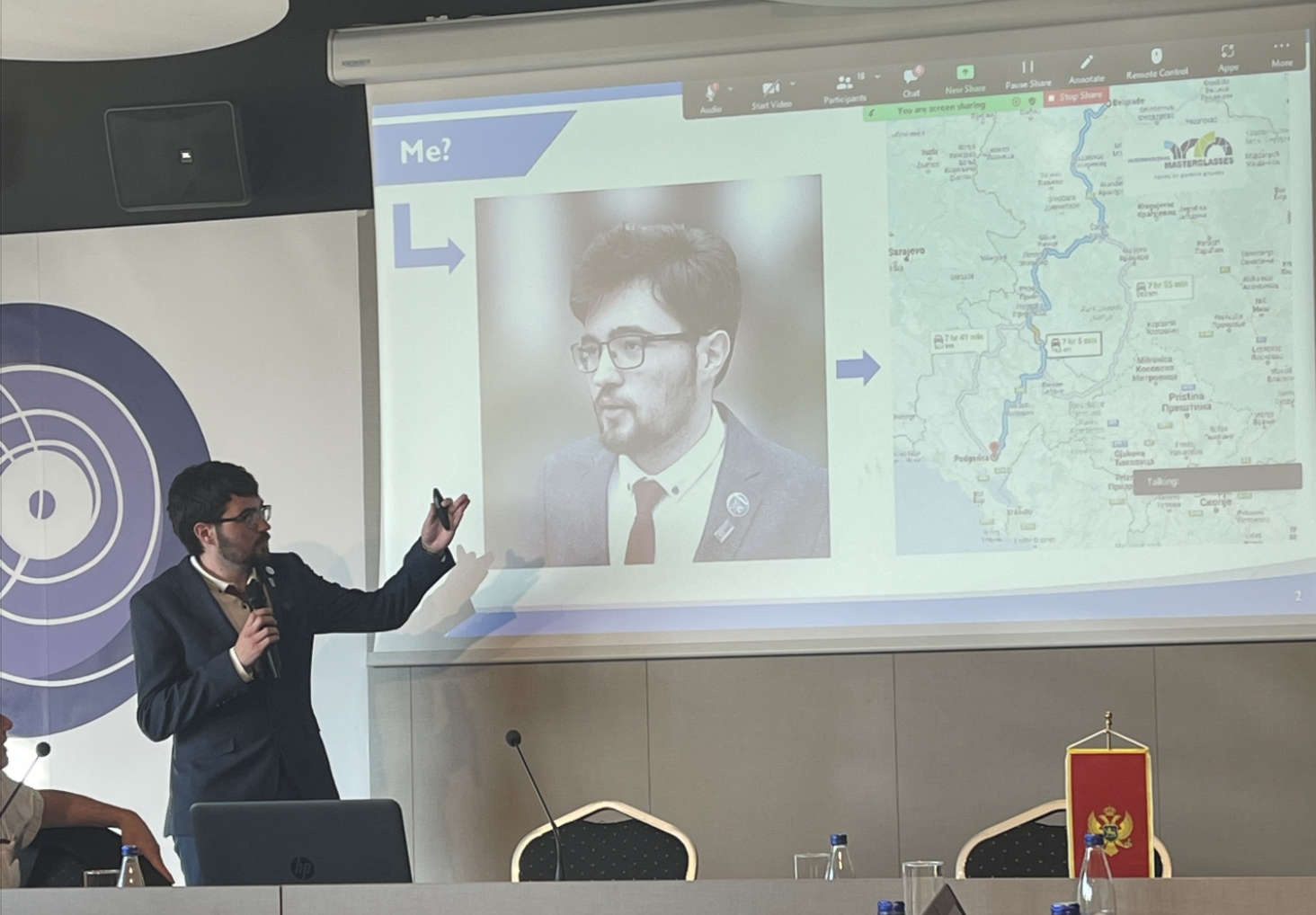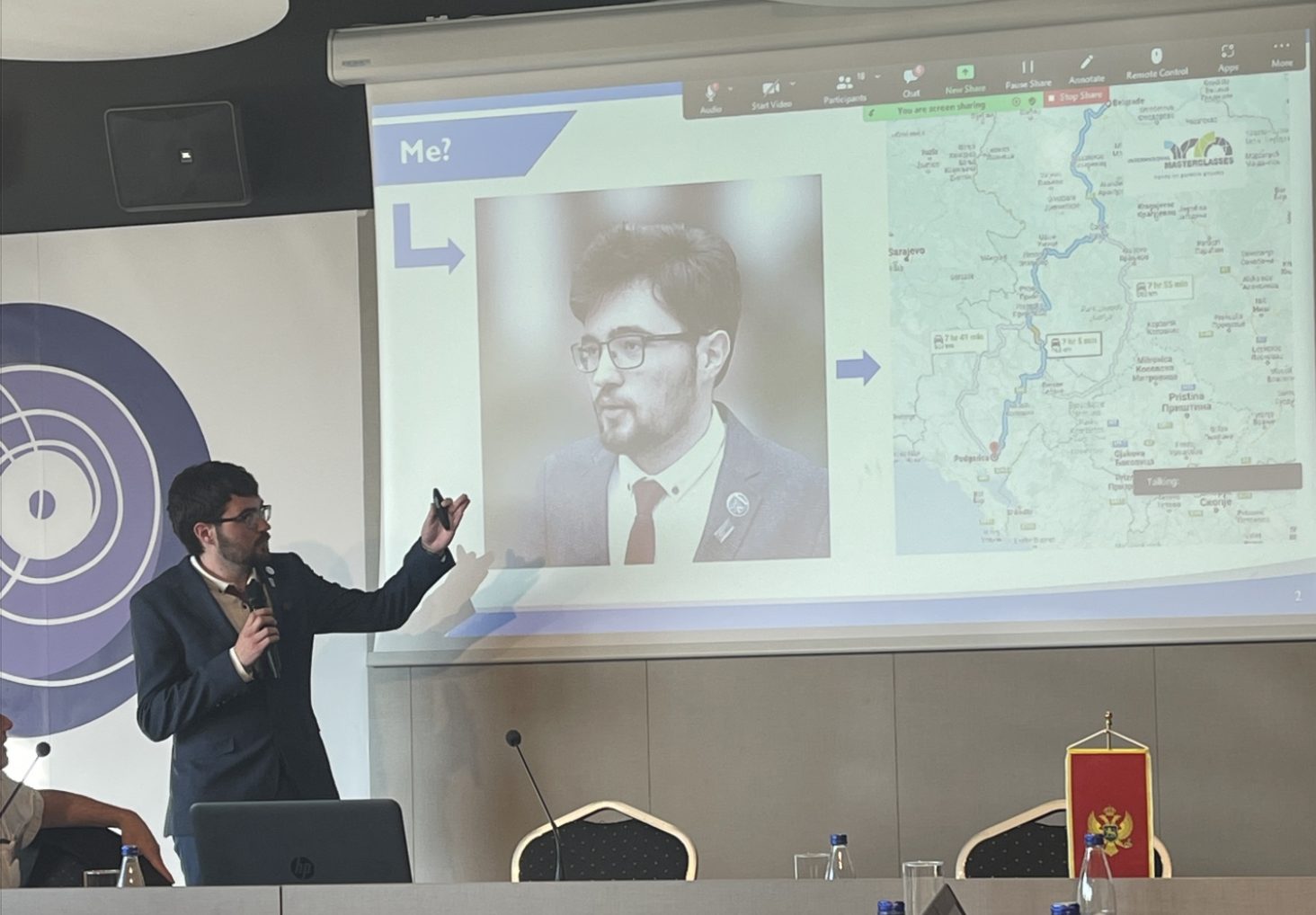by Fabiola Cacciatore
Interview with Zlatan Vasovic, IT Manager of the International Association of Physics Students
From Belgrade to Podgorica (Montenegro), the bus journey is very long. Zlatan Vasovic arrived at 3 am, on 11 May 2022 to attend the IPPOG spring meeting in the afternoon. He gave a presentation about the association of which he is IT manager: International Association of Physics Students (IAPS). In fact, Zlatan had been invited by IPPOG to present the IAPS report. His presentation was impressive and in June IAPS became an IPPOG contributor.
Also, Zlatan's personality has the carefree charm of a young student with an impressive background and a admirable personality, but at the same time, a determination to pursue his dream of working in the world of physics.
For these reasons we interviewed him and we can't wait for his appearance at the bi-annual IPPOG meetings on October 2022. Before starting the interview, we want to give IAPS a warm welcome to the IPPOG family. We are sure that this collaboration will lead to pleasant results.

1. What is the purpose of your association?
IAPS exists as a connecting place for physics students all over the world. Our unofficial motto is “for physics students, by physics students”, which says a lot about our purpose – in IAPS, physics students create activities for themselves. This may seem easy, but it definitely isn’t, especially on the international level. And that’s exactly why an international association is needed.
Our aims are to encourage peaceful international collaboration, support young physicists, and help them to build professional and interpersonal relations. We do this by organizing international events and activities such as annual International Conference of Physics Students, PLANCKS physics competition, and a visit to CERN, conveniently called iaps2CERN.
2. From what we can see you are a huge association. How are you organised? Do you have a scientific committee? A president?
We are an association of organisations representing physics students and individual members. Those organisations appoint delegates to IAPS. The at the international level we have an Annual General Meeting of delegates, which decides the future of the association and elects the Executive Committee (EC) and several other officials.
EC takes charge of the association between two annual general meetings and deals with daily business of IAPS. It’s composed of the President, Treasurer, Secretary and up to 6 other members with specific responsibilities (for example, my current role is IT Manager). The President directs the work of EC and IAPS, but all decisions are made democratically. EC members have their own working groups, essentially like departments, which are open to all our members to join.
We don’t have a scientific committee, but we have two related working groups – Events, as most of our events are science-related, and Advocacy & Outreach, a part of which deals with promotion of science.
3. During the last meeting you talked about diversity and inclusion. What your association does about this? What are your actions?
It’s an important aspect of our association. Our founding documents were written with non-discrimination, diversity and inclusion in mind, and we take great care that those values are implemented in our activities. For this purpose we have more practical guidelines that activity organisers can use.
Great part of this effort in IAPS, is the Advocacy & Outreach working group, to which diversity and inclusion are crucial. It has the goal of IAPS progressing towards an engaging, diverse, and inclusive organisation it aspires to be. Another aspect is the Recruitment working group – we strive to expand into new countries and get an even more diverse, international representation of physics students. There is also frequent communication with our members about those topics, for example through our social media.
From my personal side, I helped the IAPS activities aiming to increase inclusion and diversity by collaborating with the working groups I mentioned. I also joined the IPPOG’s Diversity, Inclusion and Accessibility Working Group, where I shared the knowledge and experiences from IAPS.
4. Which are the requirements for joining your organisation?
We have three types of members:
- National Committees, representing physics students from one or more countries
- Local Committees, representing physics students from one or more cities Individual
- Members, physics students not represented by local or national committees
So it’s simple: if your organisation represents physics students at national or local level, you can join IAPS! National committees are usually student sections of national physical societies (e.g. Young German Physical Society), or national associations of physics students (e.g. Italian Association of Physics Students). On the other hand, local committees are usually local student organisations or clubs. Physics students join IAPS by joining their local or national committees.
If you are a physics student and there are no committees representing you, you can join IAPS directly as an Individual Member. It’s important to note that our definition of physics students is broad – we accept bachelor, master and PhD students of physics and physics-related disciplines, as well as up to 12 months after graduation.
There is also the fourth type, Honorary Members This title is given to individuals or organisations who have made distinguished services to IAPS. For example, Joseph Rotblat, Nobel Peace Prize winner, had this title.
So even if you are not a student anymore, you can still become a member of IAPS! (But it won’t be easy!)
5. What do you think IPPOG can give you and what can you bring as an added value to IPPOG?
I learned from personal experience that IPPOG and IAPS share many common values and goals, such as international collaboration and outreach. There is a lot of space to work together in those areas. For example, we could organise a joint event or activity for particle physics outreach. Both organizations also want to expand into new countries and we know how hard this can be sometimes. By collaborating, we can reach this goal faster.
There is one hidden benefit which may be easily overlooked. Many students who are now members of IAPS will be particle physicists or science educators in the future. If they have exposure to IPPOG at such an early stage, both IPPOG and students will benefit professionally. Students, because they will have more career opportunities, and IPPOG, because it will have even more talented people in its network.
Our partnership is still young and I’m sure more will come of it. I’m excited to see what will happen in the future!



